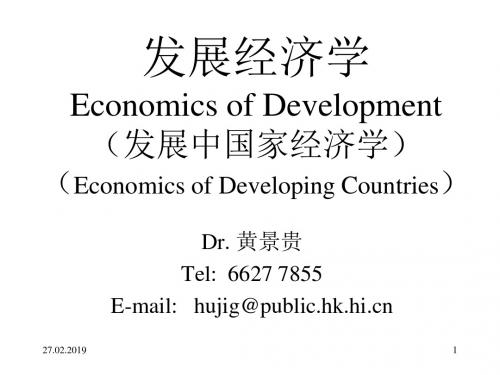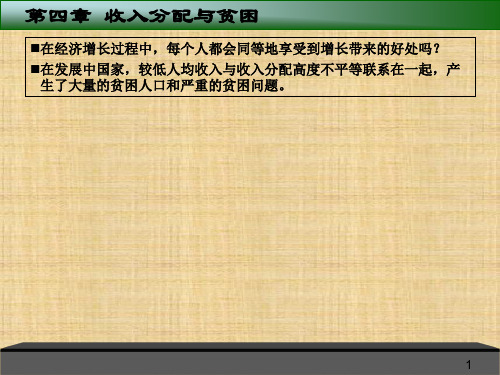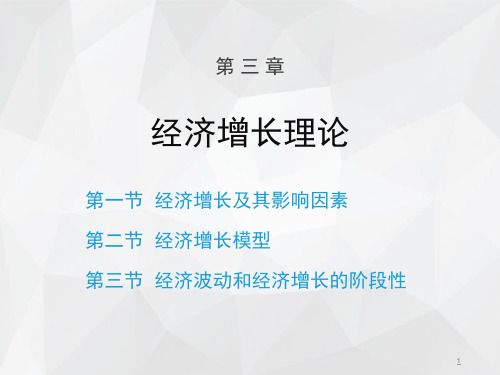发展经济学英文课件(13)
- 格式:pdf
- 大小:3.96 MB
- 文档页数:23


•发展经济学概述•发展中国家经济发展现状与问题•经济发展理论与政策•全球化与经济发展目录•可持续发展与经济发展•创新、创业与经济发展01发展经济学概述发展经济学的定义与特点定义:发展经济学是研究发展中国家经济增长、经济发展、经济转型以及相关政策与战略的学科。
强调经济增长与经济发展的内在联系。
重视政策分析与实证研究。
01 02 031 2 301 02 030102起源20世纪50年代至60…20世纪70年代至80…20世纪90年代至今未来展望030405发展经济学的历史与发展02发展中国家经济发展现状与问题发展中国家的经济发展现状经济增长迅速许多发展中国家在过去几十年中实现了显著的经济增长,特别是在亚洲和非洲地区。
产业结构多样化发展中国家的产业结构正在从以农业为主向制造业和服务业转变,尤其是信息技术、金融和旅游等领域。
城市化进程加速随着工业化和现代化的推进,发展中国家的城市化进程正在加速,城市人口比例不断上升。
发展中国家面临的主要问题贫困和不平等基础设施落后教育和卫生问题环境问题发展中国家的经济发展战略促进经济增长推进教育和卫生事业发展A B C D加强基础设施建设实施可持续发展战略03经济发展理论与政策经济发展的概念、特点、与经济增长的区别与联系。
经济发展的定义与内涵从重商主义、古典经济学、新古典经济学到发展经济学的理论演变。
经济发展理论的演进结构主义、新古典主义、激进主义等流派的主要观点和政策主张。
经济发展理论的流派经济发展理论概述产业政策财政政策货币政策社会政策经济发展政策的主要内容经济发展政策的实践与效果发展中国家的经济发展实践东亚奇迹、拉美债务危机、非洲贫困化等案例的分析。
发达国家对发展中国家的援助政策援助方式、援助效果及存在的问题。
全球化对发展中国家的影响及应对策略全球化带来的机遇与挑战,以及发展中国家的应对策略。
未来经济发展趋势及政策建议基于当前全球经济形势,预测未来经济发展趋势,并提出相应的政策建议。


Robert Fogel’s forecasting Chinese economy in 2040 发展经济学 development economics讲课人:李实本课程的结构1.发展经济学研究范畴、方法和历史演变1.1研究范畴1.2发展的测度1.3研究方法1.4历史演变2.发展与增长理论2.1增长与发展的差异2.2增长理论:Harrod-Dmar model; Solow model; convergence: unconditional and conditional.2.3新增长理论2.4人口增长与经济发展2.5经济发展与人类发展3.发展与收入分配3.1收入分配的现实与理论3.2收入决定机制与因素分析3.3经济发展与收入差距3.4经济增长与收入分配3.5中国收入分配的变化趋势4.发展中国家中的贫困问题4.1绝对贫困与相对贫困4.2贫困线的设定4.3贫困标准的选择:收入还是消费4.4贫困的度量:贫困发生率、贫困距和加权贫困距4.5中国的贫困状态5.发展中国家的劳动力市场与人力资本5.1劳动剩余与两部门模型5.2劳动力市场中工资决定机制5.3劳动力市场中歧视问题5.4中国农民工的工资与歧视状态的研究5.5劳动力流动与城乡差距5.6教育、健康与经济发展6.土地与经济发展6.1土地产权与租赁制度6.2土地租赁合同理论6.3土地产权制度理论7.资本市场与经济发展7.1信贷市场的不完善性7.2农村信贷市场的功能与发展7.3非正规信贷市场7.4资本市场的制度与信贷市场的发展8.保险与发展8.1保险的功能8.2完善的保险模型8.3保险的局限性:信息的不对称性8.4保险的执行困难9.国际贸易与经济发展9.1国际贸易的基本理论9.2比较优势理论9.3世界贸易格局9.4贸易政策和发展战略10.制度与经济发展10.1新制度经济学对经济发展的启示10.2政府与市场的作用10.3经济改革与经济发展11.发展经济学的未来方向11.1理论还是经验研究?11.2中国经济发展的经验如何上升到一般的经济发展理论1.发展经济学研究范畴、方法和历史演变1.1研究对象(DE是什么)What is economic development?(1)Economic development is the development of economic wealth ofcountries or regions for the well-being of their inhabitants.(2)The process whereby the real per capita income of a countryincreases over a long period of time, subject to the stipulations that the number of people below an absolute poverty line does not increase and that the distribution of income does not become more unequal.(3)Economic development is a means to make mass people out ofpoverty.What development economics studies?DE studies the economic structure and behavior of the poor (less developed) countries (Lewis, 1984).Development Economics (DE) studies the economic transformation of developing countries (Debraj Ray, 1998).The major task of DE is to explore the possibilities of emancipation from poverty for developing economies (Yujiro Hayami, 2001).DE is about the big issues: how economies and societies grow and change (N. Stern, 2001).Backward ➙underdevelopment ➙ less developed countries ➙ poor countries emergent countries ➙ developing economies.1.2 研究内容(研究什么)(1) 理解现在世界各国发展的不平衡性。


发展经济学英文原著English:"Development economics is a field of study that examines the economic aspects of the development process in low-income countries. It seeks to understand the causes and consequences of poverty, inequality, and underdevelopment, and to formulate policies and strategies to promote economic growth, reduce poverty, and improve living standards in these countries. The foundational works in development economics include seminal contributions by economists such as Arthur Lewis, Gunnar Myrdal, and Walt Rostow. Arthur Lewis's dual-sector model, which posits a transition from a traditional agricultural sector with surplus labor to a modern industrial sector as the engine of economic growth, remains influential in understanding structural transformation in developing economies. Gunnar Myrdal's concept of cumulative causation emphasizes the role of positive feedback loops in perpetuating poverty traps and underdevelopment, highlighting the importance of policy interventions to break these cycles. Walt Rostow's stages of economic growth theory proposes a linear progression of economic development through stages of traditional society, preconditions fortake-off, take-off, drive to maturity, and high mass consumption, providing a framework for understanding the trajectory of economic development. These foundational texts laid the groundwork for subsequent research and policy debates in development economics, which continue to evolve with changing global dynamics and emerging challenges."中文翻译:"发展经济学是研究低收入国家发展过程中的经济方面的一个领域。